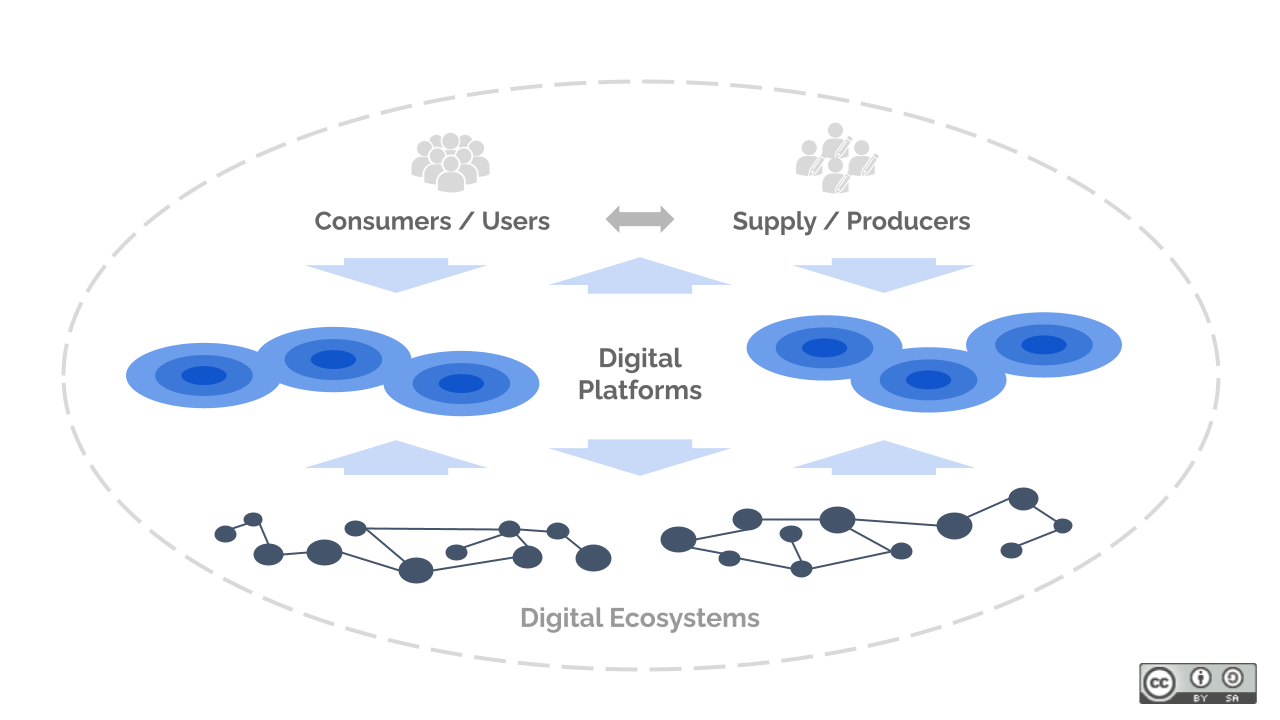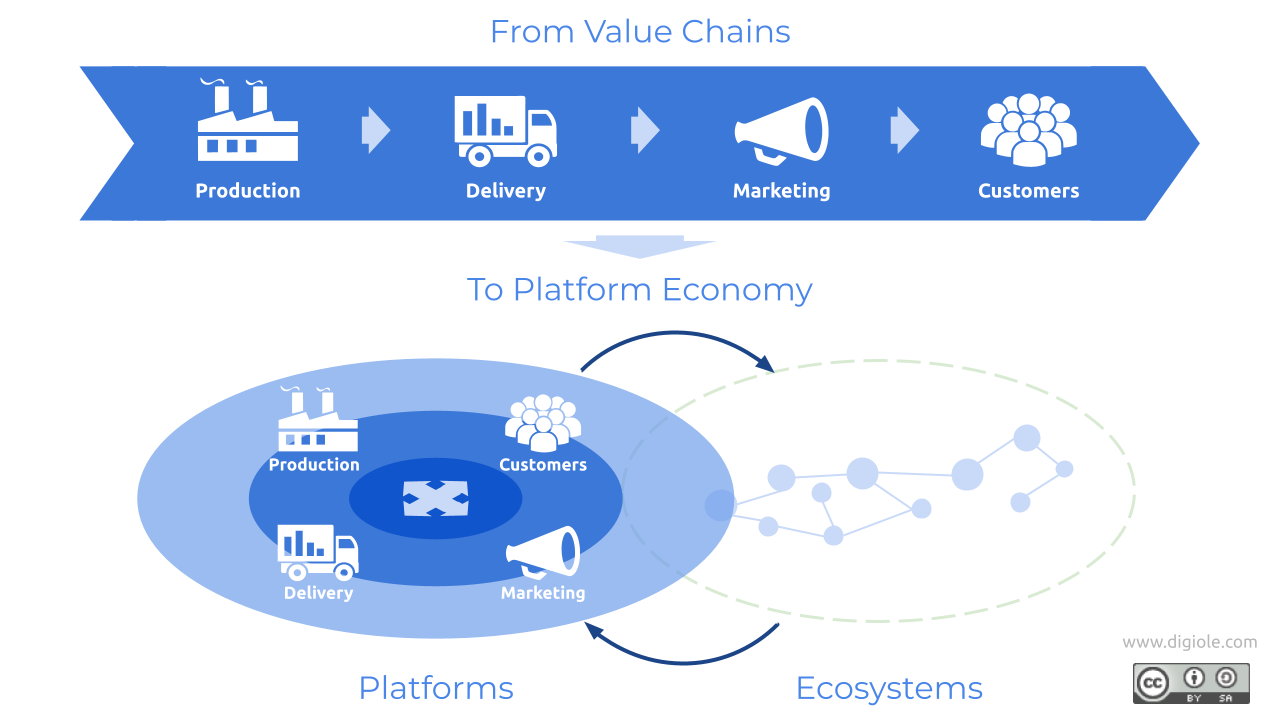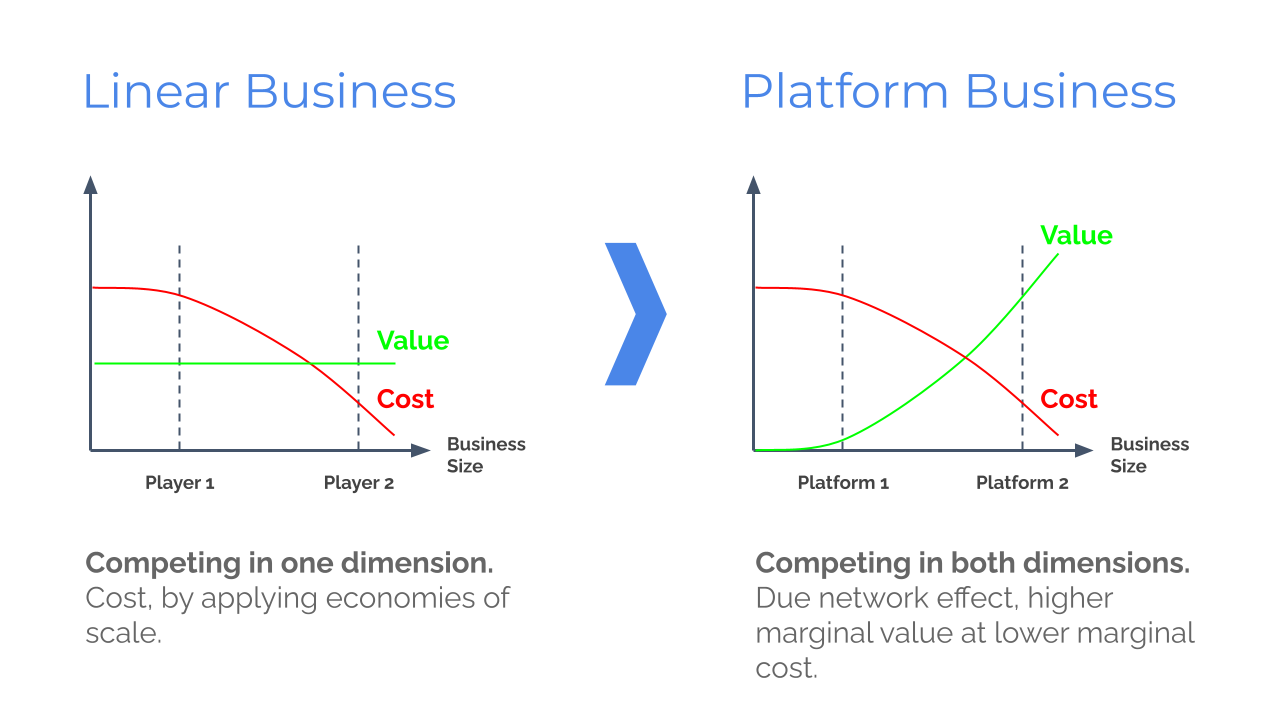Platform Economy
The platform economy is a rapidly establishing business organization model that has emerged from the development of the Internet and is used especially for the implementation of rapidly scalable service entities. With the platform economy, productive ways have been found to apply information technology and software know-how holistically as a platform for the entire company's or organization's operations. This allows for systemic change, new business models and more productive structures.
Digitalisation is present everywhere today. Digitalisation is horizontal. Computers and Mobile Phones are everywhere: in businesses, in citizens, in public services. The knowledge base and development needs of different industries and sectors of society have traditionally been very different.
With the platform economy, this is changing - industries and sectors are seen as applications of the same phenomenon that can be implemented on platforms that integrate with their basic solutions. Information technology has first been applied to individual tasks, functions, or organizations. Now documents or data from different parts of the organization are brought to the same cloud - a common platform. We want to get rid of silos and make information move.
In the transition to a platform economy, the construction of the internal unity of the organization is rapidly moving to the unified and utilized management of the information of the world outside the organization. Let’s move away from our own silos and move to improve productivity by opening our own interfaces and connecting our own know-how, data and networks to the ecosystems of fast-growing partners. Organized to produce customer value on common platforms.
Digitalisation is present everywhere today. Digitalisation is horizontal. Computers and Mobile Phones are everywhere: in businesses, in citizens, in public services. The knowledge base and development needs of different industries and sectors of society have traditionally been very different.
With the platform economy, this is changing - industries and sectors are seen as applications of the same phenomenon that can be implemented on platforms that integrate with their basic solutions. Information technology has first been applied to individual tasks, functions, or organizations. Now documents or data from different parts of the organization are brought to the same cloud - a common platform. We want to get rid of silos and make information move.
In the transition to a platform economy, the construction of the internal unity of the organization is rapidly moving to the unified and utilized management of the information of the world outside the organization. Let’s move away from our own silos and move to improve productivity by opening our own interfaces and connecting our own know-how, data and networks to the ecosystems of fast-growing partners. Organized to produce customer value on common platforms.
Digital Platform Economy Concept Model
Digital platforms refer to IT systems in which different actors - users, providers and other stakeholders across organizational boundaries - work together to add value in accordance with common policies. They are strongly determined by a new cumulative and value-transmitting resource: digital information, data, and the technologies that seek to process it, especially software and automation.
Read more: platform development.
Digital platform ecosystems are networks of interdependencies in which the autonomous action of the parties forms a whole whose value is significantly greater than the sum of its parts. In ecosystems, service providers and their partners come together to develop complementary product-service entities and total solutions that generate customer value on selected themes.
Read more: Platform ecosystem development.
The digital platform economy, on the other hand, describes a market in which business based on digital platforms has achieved a significant or dominant market position.
Read more: platform development.
Digital platform ecosystems are networks of interdependencies in which the autonomous action of the parties forms a whole whose value is significantly greater than the sum of its parts. In ecosystems, service providers and their partners come together to develop complementary product-service entities and total solutions that generate customer value on selected themes.
Read more: Platform ecosystem development.
The digital platform economy, on the other hand, describes a market in which business based on digital platforms has achieved a significant or dominant market position.
From Value Chains to Platforms
In the platform economy, value creation shifts from the traditional optimization and management of value chains to the creation of cross-platform platform ecosystems across organizations and industries. The new value creation model is based on the joint interactive functioning of the ecosystem formed by the actors, supported by the platform, and the generation of innovations, utilizing the “new” marketplace enabled by the platform.
When a company operating with traditional value chain logic seeks to sell the value created directly to the customer, the purpose of a multi-party platform is to enable value creation between different actors in the platform, and to distribute value to the parties in a jointly defined way.
When a company operating with traditional value chain logic seeks to sell the value created directly to the customer, the purpose of a multi-party platform is to enable value creation between different actors in the platform, and to distribute value to the parties in a jointly defined way.
Actors in the digital platform economy are looking for new, alternative or complementary business models to help them make the most of the opportunities offered by digitalisation. The goal is to add new functionalities to value chains and networks, thus creating new value for those involved. They combine data (real-time and inventory), data exchange interfaces (APIs and boundary resources) and data analytics tools (especially software) into mutually supportive entities, and seek new ways to generate customer value in their network of ecosystem partners. The aim is to systematically re-implement the solutions that utilize the market the most by means of the platform economy and to continuously accumulate value on the platform.
Ecosystems organize their activities on platforms that form new customer interfaces. Data becomes a new value creation tool and data analytics becomes a new optimization tool. New value is created together with customers, in constant interaction (24/7).
Ecosystems organize their activities on platforms that form new customer interfaces. Data becomes a new value creation tool and data analytics becomes a new optimization tool. New value is created together with customers, in constant interaction (24/7).



